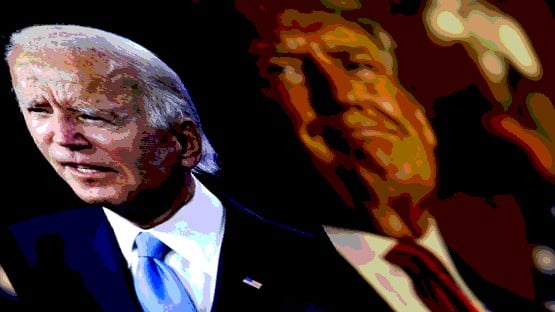
Unions are once again playing a significant role in a presidential election. Joe Biden joins striking auto workers on a picket line in Michigan; Donald Trump meets with Teamsters leaders at Mar-a-Lago and Washington D.C. Vying for working-class votes, the candidates show how choices made by both union and non-union workers are seen as pivotal to election victory.
But 2024 differs from all previous elections, and the difference carries strong implications for the role of unions. Mr. Trump faces 91 felony indictments, including the federal charge of “conspiracy against the right to vote and to have one’s vote counted.” He had made clear months before the 2020 election that he wouldn’t accept as legitimate any electoral results handing victory to Mr. Biden.
By word and deed, Mr. Trump helped destabilize American democracy, but he’s never really functioned as a solo operator. As political scientist Erica Chenoweth observed about the U.S. more than a year ago, “the key prerequisites for a multiracial democracy to sustain itself are no longer in place. Many of the candidates from one party refuse to accept the outcome of the last election, won’t commit to accept a loss at the next election and are openly either endorsing, fomenting, or turning a blind eye to political violence.”
Strong forces press the nation toward what is called “electoral autocracy,” or “authoritarianism with the semblance of procedural democracy,” and a re-election of Donald Trump will clearly accelerate that movement. Unions and union voters must therefore play an ever more important role, not just as figures in the numbers game of political strategy, but as agents of democracy.
From the 1940’s to the early 1970’s, unions helped suppress the economic inequality that could have corroded American democracy during those decades. Over the years, effective unions have created bonds among working people that helped build trust and fend off the “atomization” and despair that would otherwise incline individuals to authoritarian leaders. And it’s no coincidence that states with higher levels of union membership (e.g. New York at 24.7 percent and Hawaii at 23.0 percent) have enacted either none or far fewer voter restriction laws than states with low levels of union membership (e.g. North Carolina at 3.9 percent; South Carolina at 3.2 percent).
Union members played significant roles in the 2020 election by canvassing hundreds of thousands of voters and by protecting poll watchers and voters from intimidation. They’ve lobbied Congress for voting rights legislation. And they did this despite the fact that, according to exit polls, a significant proportion of union members did vote for Donald Trump in 2016 (43 percent) and 2020 (40 percent).
Mr. Trump’s appeal in those elections may be attributed to the decades’ long neglect of labor by Democrats, while union membership declined in response to union-busting and a generally hostile legal environment. Nevertheless, Mr. Trump’s losing margin did increase by eight points when Joe Biden ran against him in 2020, and the shift may have derived not only from Mr. Biden’s professed support for unions, but also from Mr. Trump’s own record as president.
Mr. Trump appointed corporate-friendly individuals to the National Labor Relations Board and Department of Labor, rolled back health and safety workplace regulations, and supported a key Supreme Court ruling (Janus v. AFSCME) that helped weaken public employee unions, among other things. When asked during his first campaign if he supported unions, he said that as a businessman he had “great success” with both union and non-union labor, though he also noted, “if I had a choice [i.e. between working with or without a union], I think I’d take it without.”
By themselves, unions obviously can’t resist an authoritarian takeover of the U.S. As political scientists Erica Chenoweth and Zoe Marks argue in a recent report, a “large-scale, multiracial, cross-class, pro-democracy united front” is needed to do this work – a difficult, unprecedented kind of work. And with the election just a few months away, it’s work that must entail a critical weighing of many factors, not just reservations about Mr. Biden’s candidacy but also considerations of what’s most critically needed to protect democracy – not only in the near term but for years to come.
Unions have a critical place in these tasks. Perhaps the most succinct reason was articulated by the three co-presidents (Ada Briceno, Susan Minato, and Kurt Petersen) of UNITE Local 11, a 32,000 member union comprising hotel housekeepers, bartenders, cooks, and other working people – a union that sent many members to canvass in Arizona during the 2020 election and later to Georgia to help flip the Senate. Writing about this engagement, these three leaders stated simply, “As we see it, a strong union does more than negotiate work contracts. It helps workers become active citizens who stand up for their democratic rights.”
Andrew Moss, syndicated by PeaceVoice, writes on labor and nonviolence from Los Angeles. He is an emeritus professor (Nonviolence Studies, English) from the California State University.










